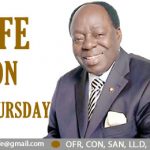T HE Peoples Democratic Party (PDP) entered the year 2018 a factionalised and divided party. Not many gave it a chance as its members were drifting to the ruling All Progressives Congress (APC) in numbers. The Fresh PDP, a group of members disgruntled over the conduct of the December 9, 2017 national convention of the party, which was claiming to be the authentic PDP, sought to hold the party by the jugular to press home its quest for recognition.
It was thought that the party that had gone through torrid times and its woes were in remission after a successful conduct of the convention, was about to face a new round of crisis. But the Fresh PDP disappeared as fast as it came to pave the way for the Prince Uche Secondus-led National Working Committee (NEC) to face its task of Rebuilding, Rebranding and Repositioning (3Rs) process which it imposed on itself after the December 2017 convention. It appears that the Secondus team was able to consolidate on the 3Rs and return 2018 as one of the most active years the party has ever witnessed since its days out of power. In fact, some commentators said that the outgone year was the party’s best since it lost power in 2015.
Before it gained that stability, the PDP was a shadow of itself, struggling in the preceding years to recover from its fall from grace and the odious treatment meted out to its members by the new ruling party. It found itself in one leadership crisis after another that saw the mantle changing several times from Secondus, as the acting National Chairman through Senator Ali Modu Sheriff, as the substantive National Chairman to Senator Ahmed Makarfi, as the Chairman of its National Caretaker Committee (NCC), and then back to Sheriff and back to Makarfi yet again. All this game of musical chairs was orchestrated by conflicting rulings from different courts, sometimes of coordinate jurisdiction, in the land until the Supreme Court brought sanity into the system by giving final validation to the process that gave rise to the Makarfi-led NCC.
With the leadership crisis seemingly behind him, Secondus was intent on achieving his 3Rs goals for the former ruling party to endear it to Nigerians once again. He put it thus: “We are rebranding and repositioning to make our party open to all and regain the land for the people. We are determined to give opportunities to the youths and our women. We also want to mentor a new generation of young Nigerians that will take our nation to the next millennium.”
He, therefore, embarked on an expedition, rallying former prominent members of the party, opinion leaders and even former President Ibrahim Babangida behind his new vision for the party. That vision, he explained wherever he went, was to return the party to the people and to do away with past shenanigans, particularly impunity leading to imposition of election candidates.
During the NWC’s visit to the former military leader and listening to the party leaders, Babangida said: “I am happy at your assurances that there will be no imposition in all your primary elections. It is all about choice and you have promised to provide the best choice.
Your Reposition, Rebrand and Regain agenda is working and I mean particularly the rebranding. Some people believed that having been in government since 1999, the PDP will find opposition difficult but you are carrying on well and providing a better alternative.”
That attitude gained traction and it gave the PDP and its members nationwide the much needed confidence to face the dirt thrown at them. The mission of the party’s national leadership to convince former members who had joined the APC but had become disenchanted with the ruling party and prospective new entrants to sign on with the party, crystallized during the year. The party was clear that it wanted all its original members back and more. It provided the enabling environment by promising a level playing field for all members and joiners apart from assurances that impunity had become a thing of the past.
The National Chairman of the party specifically charged its state chapters to throw their doors open for interested people, saying: “No state should bar anybody, who has left the party from joining us back because we are repositioning to take over power from the All Progressives Congress (APC). The PDP is getting stronger everyday, we are rebranding, rebuilding and repositioning to reclaim our position, which was mistakenly given to APC by Nigerians in 2015.”
Former Vice President Atiku Abubakar, who had become one of the giants of the APC, seized the initiative earlier in December 2017, took a bold step and returned to the PDP. While the move was dismissed in some quarters as Atiku merely exhibiting his traits of an itinerant politician, the party hierarchy saw the return as an opportunity to build upon. Following Atiku’s return to the party where he served as the nation’s number two citizen for eight years, the PDP harped on the need for others to rejoin and many politicians formerly of the PDP stock came back in droves, encouraged to emulate Atiku.
Early in the year, the PDP still struggled with its corruption reputation having been so successfully tagged by the ruling party. And with 2019 approaching fast and furiously, the party contemplated a change of name to make it harder for the APC to tar it.
In fact, it was suggested in some quarters that many prominent members of the APC who had expressed their desire to return to the PDP had hinged it on the condition that the party changed its names. This was thought to have been considered at various levels but in the end, the party hierarchy decided against a change of identity.
Fortune smiled on the party as in a move that was a kin to an earthquake to the APC, many of its national lawmakers including Senator Rabiu Kwankwaso, defected en-masse to the PDP. This was soon followed by the unexpected defection of Governors Sam Ortom and Aminu Tambuwal of Benue and Sokoto states, respectively.
But the game changer was the dumping of the ruling party by Senate President Bukola Saraki and the the Speaker of the House of Representatives, Yakubu Dogara, to pitch tent with their former party, the PDP. This move put the control of the National Assembly firmly in the control of the opposition party.
If the APC was not perturbed by its woes before this, it was certainly shaken to its foundation by these defections, which the main PDP was only too keen to lap up. The party had cried continuously about intimidation and harassment of its members in the ruling party’s bid to emasculate the opposition. But the PDP became renewed, talking with bold voices that seemed to drown the shrill of the ruling party as these former APC leading lights joined it.
The downside of the party during the year though was its string of election loses. From Ekiti through Osun states’ gubernatorial polls to bye elections in several states, the PDP did not find crumbs to pick. For the party which ruled the country for 16 years, many of these elections were stolen from it by the President Muhammadu Buhari administration, using the instrumentality of state, especially the security forces and the Independent National Electoral Commission (INEC), to manipulate the election apart from the out right vote buying that was perpetrated in the exercises. The PDP is confident that it could have its stolen mandates restored by the Judiciary in most of these elections.
The national convention of the party was the icing on the cake as far as rebuilding, rebranding and repositioning of the party is concerned. Against all permutation of an impending implosion, the exercise was arguable flawless with Atiku emerging as the party’s flag bearer in the 2019 presidential election while other former rivals in the race for the ticket resolved to line up behind him. Observers believe that the PDP has substantially been able to remodel itself and is primed to have a go at the presidency once again.
The party has seen out its best year in nearly four by reversing its odds and putting the APC on the back foot on all fronts, including on the three planks of fighting corruption, ensuring security and reviving the economy, upon which the APC rode to power but by the opposition’s estimation, has grossly failed to deliver.
Therefore, as the PDP heads into the new year, election year, it is buoyed by renewed confidence arising from its apparent re-acceptance by Nigerians during the last year, and its perception as a credible alternative to the APC.






